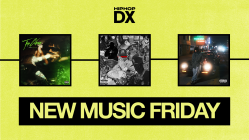In many ways, 2003 was an important year for rapper Lil Kim; a few years removed from her platinum-selling sophomore album, The Notorious K.I.M, and her first Grammy alongside Christina Aguilera, Mýa and Pink for the Missy Elliott and Rocwilder-produced “Lady Marmalade,” she had reached her mainstream apex, and all eyes were on what she was about to do next.
She was also in the midst of turmoil. Her beef with rival MC Foxy Brown had culminated in a shooting outside of Hot 97 on February 25, 2001–when her entourage had a run in rapper Capone of Capone-N-Noreaga and his crew, allegedly over Foxy Brown’s verse on the group’s blistering single “Bang Bang.” Her inconsistent account of the event to authorities would later see her (and a friend) charged with perjury, serving one year in jail, which was lenient considering she was initially facing a maximum of 20 years.
It was following the 2001 situation that Kim began to separate herself from Lil Cease and Junior M.A.F.I.A., Sean “Diddy” Combs and her usual circle in favor of new energy; as a result, La Bella Mafia, one of the most consistent efforts in Kim’s catalog, serves as both a metaphorical and literal refresh–a push of the reset button.
Commercially, it was a rousing success, selling over a million copies and spawning two of the biggest singles of her solo career (a height she wouldn’t reach again on subsequent efforts).
Hailed by many as a classic, the album turns a–frankly–distressing 20 years old as of March 4, 2023. Here at HipHopDX, in celebration of this milestone, we’re breaking down 10 things you may (or may not) have known about La Bella Mafia.
1.The original title for the LP was Hollyhood
La Bella Mafia was originally going to be titled Hollyhood. However, as Lil Kim revealed in multiple 2003 interviews, everything changed one night when she watched David Greene’s made-for-TV movie Bella Mafia. The film, which starred James Marsden and the late Dennis Farina from Law & Order, among others, follows a group of widowed mob wives seeking revenge.
“When I watched the movie, I felt like I had so much in common with the characters,” she noted. “It worked out perfectly … I said, ‘Let me leave the ‘Hollyhood’ name for [my upcoming] clothing line.'”
Although her clothing line never quite materialized, Lil Kim has made forays over the years, most recently with a collection released in collaboration with PrettyLittleThing.
2. It’s release was a turning point in her career
This album was a new beginning. For starters, it was the first album, post Notorious B.I.G.’s 1997 murder, that saw Kim step outside of his immediate circle–as she severed all business ties with Sean Combs and officially split from Junior M.A.F.I.A. It was also her first album released outside of Lance Rivera’s Undeas Big Beat Records–still distributed by Atlantic but released solely under her own Queen Bee Entertainment.
As a result, her sound took an exciting turn; not that she didn’t work with a diverse cast of producers, but without Diddy executively producing or the Hitmen scoring her most significant singles, she took more control, working with names like Timbaland, Swizz Beatz, EZ Elpee, Havoc and Scott Storch, whom she later dated.
Not to mention, this LP garnered more Grammy nominations than any of her other solo albums.
3. One-time U.M.C.’s MC Haas G crafted the LP’s most memorable track–but not originally for Kim.
One of the album’s most potent and enduring instrumentals, “Magic Stick,” wasn’t made with Kim’s LP in mind. The song was initially meant for another now-classic New York album, Get Rich Or Die Tryin’ by 50 Cent. According to the song’s producer, Fantom of the Beat, half of the chart-topping duo U.M.C.’s (of “Blue Cheese” and “One to Grow On” fame), the beat was meant for Fif’s diamond debut. Due to politics, it was later given to Kim, who replaced the song’s original feature, Trina.
The producer explains that the Diamond Princess MC wasn’t the right fit. However, it’s hard not to picture her on the chorus when Kim exclaims, “I am the baddest chick,” which feels eerily like a reference to a familiar Trina on-wax boast (the MC even naming her 2000 debut Da Baddest Bitch).
4. Despite a disagreement with 50 Cent, “Magic Stick” was an inescapable hit
It’s interesting to imagine how much more prominent “Magic Stick,” which topped Billboard rap and radio charts, could have been–had the beef between 50 and Lil Kim not created a ceiling. Fif refused to appear in the video or perform the song live with Kim, causing apparent animosity. Making matters worse, in true 50 Cent fashion, he appeared on Hot 97 for a Funkmaster Flex takeover alongside G-Unit, slanging mud at Kim in a freestyle.
“I wrote Magic Stick, I gave Kim a hit, then I wouldn’t shoot the video, she threw a lil fit,” he rapped, adding, “Why would I care bout your emotions, you’re not my bitch.”
Hours later, shots were fired at Fif and his entourage as they exited the side entrance of the Doubletree Hotel in Jersey City, New Jersey–with Kim’s one-time fiance Damion Hardy subsequently being considered a suspect. This was the beginning of a long, sorted history between the two.
Still, the single ultimately earned platinum certification.
5.Lil Kim originally planned to work with Dr. Dre on this LP
When the session for La Bella Mafia first began in early 2002, Kim made it clear in multiple interviews that she was collaborating with Dr. Dre, noting that the two had great chemistry in the studio. However, the early collaborations, like 80% of all Dre collaborations fans have been teased with over the years, have yet to materialize. At one point, there were rumors that Kim was meant to appear on the mythical Detox album.
She did work with The Chronic producer’s most notable protege Scott Storch, who would (two years later) produce “Lighters Up,” which was named the best Brooklyn anthem by MTV in 2013.
In interviews, she also made clear her intention to work with the likes of Neptunes’ Chad and Pharrell, Eminem and Timbaland–though only the latter came to fruition, for the project’s Billboard top 20 single, “The Jump Off.”
6. Timbaland Originally Hated the Chorus On “Jump Off”
The “Jump Off” was everywhere, and part of the song’s appeal is the hook that’s catchier than a cold in a preschool classroom; however, VA super producer Timbaland didn’t initially see the same vision as Kim. According to Queen Bee, Tim initially tried to persuade her to try something else, though she held her ground for a straightforward reason: its muse, “Jeeps, Lex Coups, Bimaz and Benz” by the Lost Boyz,” was her favorite song at the time. And, according to Kim, she and the song’s featured artist Mr. Cheeks, the de facto leader of the Lost Boyz crew, had a great relationship.
Despite Tim’s apprehension, the song cracked Billboard’s top 20, peaking at number 7 on the Hot 100.
7. The Closing Diss Record Almost Won Kanye His First Grammy
The LP’s closer “Came Back For You” is even more impressive in hindsight, as the world was still a year away from the hearing song’s producer, Kanye West, in the context of his iconic debut album College Dropout–and roughly six months away from the project’s first single, “Trough The Wire.”
While the song, which took pretty direct aim at Foxy Brown and Eve, wasn’t his first time working with Kim (he co-produced “Don’t Mess with Me” off of her sophomore LP alongside D.Dot), it was his first opportunity to win a Grammy, as it was nominated for Best Female Rap Solo Performance–ultimately losing to Missy’s Timbaland-produced behemoth “Work It.”
8. Japanese Fans Got An Al Green-Sampled Bonus Track On Their Release
It’s common for a slightly different version of an album to get released in other countries–whether because a different version of a song takes off there or possibly due to licensing/clearance restrictions. However, Japanese fans hit a lick when their version of La Bella Mafia came packed with the bonus cut “What’s The Word?,” produced by underrated Harlem producer Ron Browz (of Nas “Ether” fame).
Featuring a slick sample of Al Green’s “I’m Glad You’re Mine” off of his 1972 I’m Still in Love With You LP, Kim spits some hard-as-nails rhymes that, in hindsight, seem to loosely reference her later legal issues stemming from a 2001 shooting outside Hot 97, spitting, “Niggas do dirty work the shit fall on me, but I could hold that weight and still bake that cake.”
9.Lil Kim Produced “This Is a Warning”
A little-recognized fact is that Kim is listed as the sole producer for “This Is a Warning,” a song that seems to–once again–squarely cock aim and squeeze a few veiled jabs at who we can only assume was Foxy and Eve, who she was publicly spatting with at the time.
While the song itself has aged well, its muse–“A Woman’s Worth” by now-convicted sex offender R. Kelly off of Kelly’s quadruple platinum TP-2.com–hasn’t, given what’s unfolded over the past five years. Though Kelly doesn’t appear on the track, he received a writer’s credit.
10. Remains Her Last Platinum Album

While La Bella Mafia‘s 2005 follow-up, The Naked Truth, fared well on Billboard, reaching number 6 on the Hot 200–propelled mainly by the single “Lighters Up,” the album failed to sell even half of La Bella Mafia. It would be almost 14 years until she dropped her fifth album, 2019’s 9.










I’ve loved this culture and followed it since I was a kid. More articles like this please, great work.
Appreciate that! 🙏
Thank you for honoring Kim on the anniversary of her fan-favorite album!!! Indeed, it’s surreal that 20 years have passed since this classic was released. All hail the eternal Queen Bee or Hip Hop!!!
Came back for you is one of Kanye’s hardest beats still.
Damn time flies. I was in middle school and all this phone shit hadn’t fully popped off yet. Limewire, BearShare, and Kazaa were everything you needed
Ha, if you used KaZaa, you’d be having some computer issues soon. Good old times, man does time fly.
Lol you ain’tlyin.. had to be your own tech support n shit
so biggie didnt write this one? and she basically fell off aferwards hmmmm
Keep articles like this coming. One of the better ones I’ve read on here in a while.
I’ve been bumping this lately. Jump Off is unreal.
Great article! The Naked Truth is now platinum – Atlantic Records confirmed upon the release of 9!